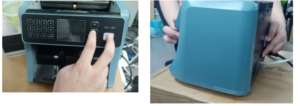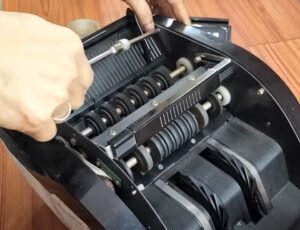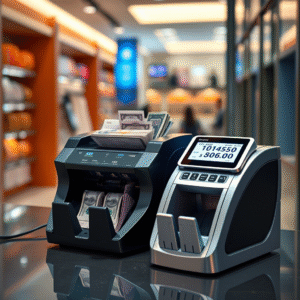The machine that counts money is most commonly called a money counter, bill counter, or currency counter. These machines come in various forms, from basic desktop models to high-speed, automated systems used in banks and casinos. The specific name can also depend on the manufacturer and its features, such as counterfeit detection or denomination sorting.
Decoding the Money-Counting Machine: Common Names and Variations
So, you’re curious about what that magical machine that whirs and spits out perfectly counted stacks of cash is called? Well, the most common and straightforward name is simply a “money counter.” Think of it like this: it counts money – plain and simple!
But, depending on who you ask and where you are, you might hear other terms thrown around. “Bill counter” is another super common one, especially since these machines primarily deal with paper currency. You might also hear “currency counter,” which is a slightly more formal way of saying the same thing.
Now, things can get a little more specific depending on the features of the machine. Some money counters can also detect counterfeit bills, so you might see them advertised as “counterfeit detectors” or “bill validators.” Others can sort bills by denomination (separating the ones from the fives, tens, etc.), and those are often called “money sorters” or “denomination counters.”
In more professional settings, like banks or casinos, you might encounter more sophisticated machines. These are often referred to as “high-speed currency counters” or “automated money processing systems.” They can handle large volumes of cash quickly and accurately, often incorporating features like batch counting and reporting.
To keep it simple, just remember “money counter,” “bill counter,” or “currency counter” – those are your go-to terms!
Behind the Scenes: How Money Counters Make Life Easier
Okay, so we know what they’re called, but what’s the big deal? Why are these machines so important? Imagine trying to count thousands of bills by hand – talk about a tedious and error-prone task! Money counters take all the hassle out of the equation.
Think about a small business owner who deals with a lot of cash transactions. Manually counting the till at the end of the day can take a significant amount of time and effort. A money counter can streamline this process, allowing them to quickly and accurately reconcile their accounts.
Banks and financial institutions rely heavily on money counters to process large deposits and withdrawals. These machines ensure accuracy and efficiency, reducing the risk of errors and saving valuable time for employees.
Casinos are another prime example of where money counters are essential. With massive amounts of cash flowing through the gaming floor, these machines are crucial for tracking and managing revenue.
And it’s not just about speed and accuracy. Money counters also help to improve security by detecting counterfeit bills. This is especially important in today’s world, where counterfeit currency is becoming increasingly sophisticated.
In short, money counters are a valuable tool for anyone who handles large amounts of cash. They save time, reduce errors, improve security, and make life a whole lot easier.
Beyond the Basics: Features to Look For in a Money Counter
Alright, so you’re thinking about getting a money counter? Awesome! But with so many different models on the market, how do you choose the right one? Here are a few key features to consider:
Counting Speed: This is probably the most important factor. How many bills per minute can the machine count? If you’re dealing with large volumes of cash, you’ll want a machine with a high counting speed.
Hopper Capacity: This refers to the number of bills the machine can hold at one time. A larger hopper capacity means you can load more bills without having to constantly refill it.
Counterfeit Detection: As we mentioned earlier, this is a crucial feature for preventing losses from counterfeit currency. Look for machines that use multiple detection methods, such as ultraviolet (UV), magnetic (MG), and infrared (IR) sensors.
Denomination Sorting: If you need to sort bills by denomination, look for a machine that has this capability. This can save you a lot of time and effort.
Batch Counting: This feature allows you to count bills in predetermined batches. For example, you can set the machine to count out batches of 100 bills at a time.
Display and Interface: Make sure the machine has a clear and easy-to-read display. A user-friendly interface will make it easier to operate and customize the settings.
Error Detection: A good money counter should be able to detect errors such as double bills, chained




